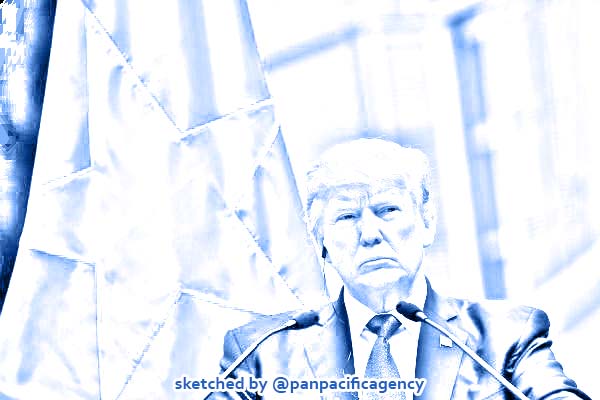Trump becomes 3rd US president to be impeached, faces Senate trial

Donald Trump and Vietnam's flag. Sketched by the Pan Pacific Agency.
WASHINGTON D.C., Dec 19, 2019, Kyodo. President Donald Trump on Wednesday became the third U.S. leader in history to be impeached as the House of Representatives accused him of pressuring a foreign country to investigate a key political rival in the 2020 election, Kyodo News reported.
The Democratic-controlled House charged Trump with abuse of power as well as with obstruction of Congress during its impeachment inquiry, setting the stage for a trial next year in the Senate, where the president is likely to be acquitted on the back of his Republican Party’s majority in the chamber.
The impeachment has raised tension between the two parties and increasingly divided the public with only about two months to go before the first votes are cast in the Democratic presidential primaries ahead of the presidential election next November.
In U.S. history, only two other presidents have been impeached — Andrew Johnson in 1868 and Bill Clinton in 1998 — but neither was removed from office as the Senate acquitted them.
Trump has been accused of pressuring Ukraine earlier this year to announce investigations into former U.S. Vice President Joe Biden, whose son had served on the board of a purportedly corrupt Ukrainian energy company.
Biden, who served under Democratic President Barack Obama, has been one of the frontrunners in the race for the Democratic presidential nomination.
The investigations into the Bidens were allegedly demanded in return for the release of congressionally approved military aid to Kiev, which faces aggression from Russia, and a White House meeting between Trump and newly elected Ukrainian President Volodymyr Zelenskyy.
Trump has also been charged with obstructing the inquiry undertaken by the House, such as by directing government officials not to comply with subpoenas.
Following eight hours of debate, the House approved the two articles of impeachment largely along party lines. The article on abuse of power was approved 230 to 197 and the other on obstruction of Congress passed 229 to 198.
Trump, who has denied any wrongdoing, tweeted in protest against the impeachment before and during the debate, saying “I DID NOTHING WRONG!” and insisting he is being framed by what he called atrocious lies by the Democrats.
The White House released a statement following the House vote, saying the president is “prepared for the next steps and confident that he will be fully exonerated” in the trial at the Senate.
Through investigations that started in September following a whistleblower report, the Democrats concluded that the president warranted removal from office as he committed impeachable offences meeting the criteria of “high crimes and misdemeanors” as referred to in the U.S. Constitution.
Democratic House Speaker Nancy Pelosi said she was “solemnly and sadly” opening the debate on the impeachment, but that the president’s actions had left her party members with no choice.
“The president used the power of his public office to obtain an improper personal, political benefit at the expense of America’s national security,” she said, adding that the abuse of power also jeopardizes “the integrity of our elections,” the basis of democracy.
Republican members of Congress fought back, asserting a lack of direct evidence of the president’s guilt and accusing Democrats of trying to reverse the 2016 election that led Trump to the White House.
The $391 million in military assistance was eventually released to Ukraine without the country announcing investigations of the type Trump supposedly requested. Zelenskyy himself has told media that he has not been pressured by Trump to carry out the investigations.
Republican Kevin McCarthy, the House minority leader, said, “By removing a duly-elected president on empty articles of impeachment, Congress would erode public trust in our system of government.”
“President Trump will still be president when this is all over. But Congress will have wasted months of time and taxpayer dollars on impeachment rather than doing what the American people want us to do,” he said.
The Democrats, meanwhile, also sought to justify a rapid timeline to impeach Trump, alleging he could undermine the next presidential race by continuing to solicit interference from foreign governments in U.S. elections.
Trump had previously faced allegations that his campaign coordinated with Russia to influence the 2016 election, but an investigation by U.S. special counsel Robert Mueller failed to establish any such collusion.
Polls have shown that the U.S. public has been sharply divided over the impeachment of the president, who has stirred controversy within and beyond the country through his norm-breaking leadership style and inflammatory rhetoric since taking office in 2017.
Republicans have so far been united behind Trump, with the president’s job rating showing no significant changes during the impeachment inquiry, which included public testimony from U.S. diplomats and other officials.
As for past impeachment cases, Clinton was charged with obstructing justice and lying under oath about his extramarital affair with a White House intern.
Richard Nixon, facing likely impeachment over his role in covering up the Watergate scandal, resigned in 1974 before the House could vote on the articles of impeachment against him.
Miya Tanaka